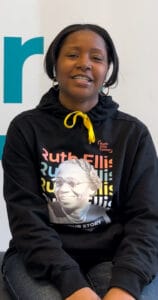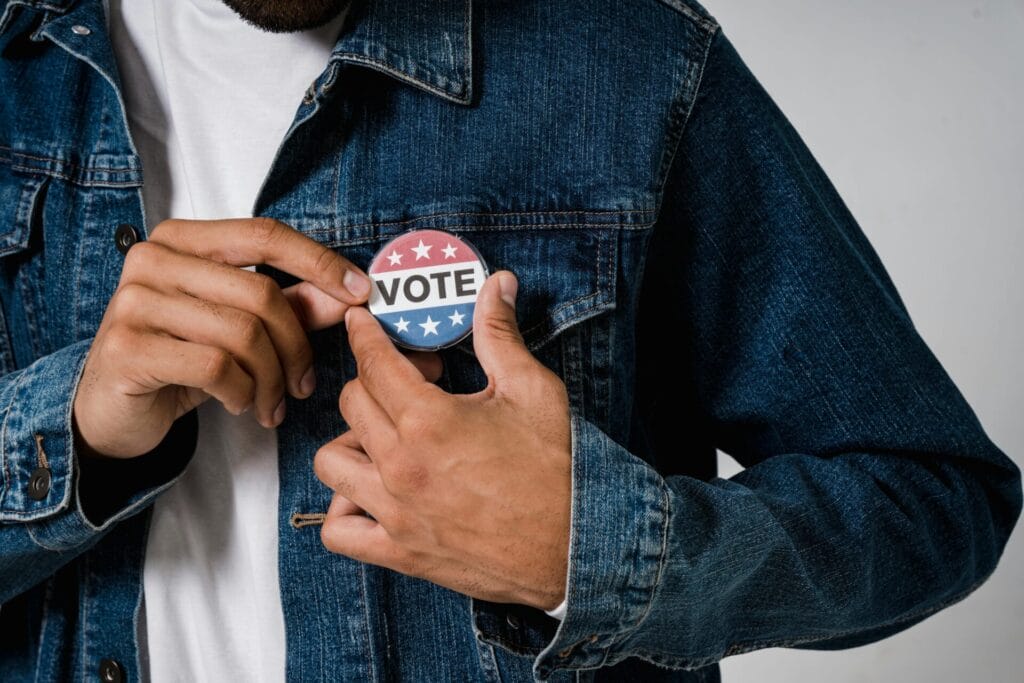
Ruth Ellis was a Black, lesbian activist who moved to Detroit in 1937. She used her knowledge of the printing press to open up her own business, the Ellis & Franklin Printing Co. with her partner Cecile “Babe” Franklin.
Ellis & Franklin Printing Co. was the first known woman-owned printing shop in the state of Michigan. With that, Ellis also dedicated her life to houseless LGBTQ youth by opening her home to serve as a safe place for same-gender loving Black Americans in Detroit.
In the spirit of Ellis, many Detroit activists met at the Ruth Ellis Clairmount Center – which focuses on on four main principles: Trauma Informed Care, Restorative Justice, Harm Reduction, and Positive Youth Development – to speak with GLAAD and Equality Michigan about what change looks like for the LGBTQ people of the Great Lake State during 2024 elections.
“I can speak from just having worked here and learning more on Ruth Ellis and her being a Black woman and seeing how she broke the mold in so many ways,” said Sheree Lampinsky, also the senior employee resource manager of the Ruth Ellis Center. “Her journey, her story, the folks that she touched, the barriers she broke being a Black business owner in the Detroit area [is] something that was unheard of at the time.”
Lampinsky carries Ellis’ legacy by being an ally and learning how to advocate for the LGBTQ community in her personal life and at the ballot box. The activist says she is “constantly growing.”

“A strength that I have now is being an ally,” Lampinsky said. “When I am in conversations that involve people that aren’t in the room, how do I show up?”
Showing up for Lampinksky looks like knowledge sharing. The activist helps loved ones and people in her life she deems a “moveable middle” audience (neither for or against the LGBTQ community) reframe and discuss the LGBTQ community if she hears harmful rhetoric. In the 2024 election year, many LGBTQ people will be up for debate in homes across the nation, and Lampinksy’s biggest fear is apathy.
“Your local elections are really what effect the biggest changes that you see in your everyday life. For me, it’s starting with these newest voters that are going to be voting for the first time,” said the activist.
Lampinksy made the point that “voting locally impacts regionally, which impacts nationally.”
While The Human Rights Campaign Foundation’s Municipal Equality Index (MEI) gave Detroit a perfect score for LGBTQ equality, there is still much work to do. In general, Michigan is still facing a barrage of anti-LGBTQ propaganda, and has some way to go before legal protections for LGBTQ adults and youth are equal to non-LGBTQ adults and youth, according to the Movement Advancement Project (MAP). This inequality often harms how LGBTQ people find each other, find their safe places, and therefore, how they advocate for and with their community.
For instance, Chris Sutton, born and raised in Detroit, broadcast manager of LGBT Detroit, a 30-year-old organization considered to be one of the largest Black-led LGBTQ organizations in the country. Their mission is to “activate, amplify, and sustain LGBT+ culture, education, advocacy, and human rights.”
“I specifically want to highlight stories from my community,” Sutton told GLAAD at the Ruth Ellis Clairmont Center. “For me, growing up, I didn’t see myself. I didn’t see Black queer representation and because of that, I didn’t see a future for myself being my authentic self.”
For so long Sutton was told he should be an athlete, hypermasculine, and live in a binary-coded world that didn’t reflect him. Yet, once he reached adulthood, he found his power and his community.

“For LGBT folks, getting to adulthood is even an accomplishment,” Sutton added. “I want to help people in our community (young and old) find their people, find their voice, find their story because that’s power.”
However, when it comes to 2024 elections, Sutton feels there is a level of “complacency” among voters. “I remember when same-sex marriage got passed, and I remember the conversation being like: ‘finally we are equal,’” Sutton recalls. “What about housing and jobs?”
In 2015, the same year marriage equality passed, Michigan’s unemployment was 4.9% and in 2024 it’s at 3.9%, according to government statistics. Additionally, across Michigan many people live below the poverty line among a shortage of affordable housing to rent or purchase, according to National Low Income Coalition.
In contrast, in the last couple years Michigan passed protections for many communities.
Michigan Governor Gretchen Whitmer in 2023 signed protections into law for the LGBTQ community and people of color, including expansions to the Elliott-Larsen Civil Rights Act and reproductive health care access.
In November 2022, Michigan voters enshrined a right to abortion into the state constitution with 57% of the vote, and elected candidates to give both state legislature chambers a pro-equality majority, according to GLAAD’s 2024 Michigan Fact Sheet.
“Today, I signed bills protecting and celebrating our fundamental freedoms as the foundation of our democracy,” Whitmer said after the signing.
Sutton reminds people that segregation laws were a reality for his parents, and “even now, specifically with LGBTQ+ folks” intergenerational violence continues to be aided by book bans, anti-LGBTQ curriculum censorship, and anti-reproductive freedom by politicians in power.
“We have to actively be aware of who we elect into office,” Sutton continued.
To check your voter registration go to www.glaad.org/vote.
Editors note: an earlier version of this article incorrectly stated Chris Sutton’s role at LGBT Detroit.













